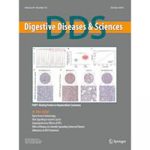Sucrase-Isomaltase Deficiency as a Potential Masquerader in Irritable Bowel Syndrome
 BACKGROUND:
BACKGROUND:
Patients with irritable bowel syndrome (IBS) frequently have meal-related symptoms and can recognize specific trigger foods. Lactose intolerance is a well-established carbohydrate malabsorption syndrome that causes symptoms similar to IBS such as bloating, abdominal pain, and diarrhea.
However, the prevalence of sucrase-isomaltase deficiency (SID) in this population is poorly defined. SID is a condition in which sucrase-isomaltase, an enzyme produced by brush border of small intestine to metabolize sucrose, is deficient. Just like lactase deficiency, SID causes symptoms of maldigestion syndromes including abdominal pain, bloating, gas, and diarrhea. In this study, we aim to determine the prevalence of SID in patients with presumed IBS-D/M and characterize its clinical presentation.
METHODS:
Patients with a presumed diagnosis of IBS-D/M based on symptoms of abdominal pain, diarrhea, and/or bloating who underwent esophagogastroduodenoscopy with duodenal biopsies and testing for disaccharidase deficiency were included. Patients with a history of inflammatory bowel disease, gastrointestinal malignancy, or celiac disease were excluded. Odds ratio was calculated for abdominal pain, diarrhea, and bloating in patients with versus without SID.
RESULTS:
A total of 31 patients with clinical suspicion for IBS-D/M were included with a median age of 46 years (IQR 30.5-60) and with 61% females. SID was present in 35% of patients. Among patients with SID, 63.6% had diarrhea, 45.4% had abdominal pain, and 36.4% had bloating. Patients with SID were less likely than controls to have abdominal pain (OR 0.16, 95% CI 0.03-0.81, p = 0.04) although no difference in diarrhea or bloating was found. Only two patients with SID underwent sucrose breath testing of which only one had a positive result. However, this patient also had a positive glucose breath test and may have had small intestinal bacterial overgrowth as a confounder.
CONCLUSION:
SID was found in 35% of patients with presumed IBS-D/M and should be considered in the differential diagnosis of patients presenting with abdominal pain, diarrhea, or bloating. Further studies should better characterize the clinical features of SID and investigate the effects of dietary modification in this group of patients.
Kim SB, Calmet FH, Garrido J, Garcia-Buitrago MT, Moshiree B.
Dig Dis Sci. 2019 Sep 6
doi: 10.1007/s10620−019−5 780−7
